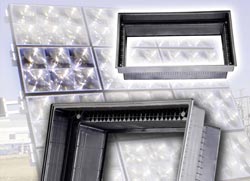Innovative concentrated photovoltaic module has housing made of strong, robust DuPont™ Rynite® PET

Photo: DuPont <br>The large housing for the concentrated photovoltaic module, measuring 83.3 cm x 56.5 cm, is moulded from DuPont™ Rynite® polyethylene terephthalate (PET) due to the material’s good dimensional stability, low distortion, attractive surface qualities and excellent melt flow.
The material was selected due to its exceptionally low warpage, high stiffness and excellent electrical insulating properties. One of the first commercial installations of the CPV modules is scheduled for September 2008 at the ISFOC (Instituto de Sistemas Fotovoltaicos de Concentración) in Puertollano (Ciudad Real), with plans for a second, 1 MW-rated unit in Castilla La Mancha Community in due course.
Concentrated photovoltaic ( or CPV) uses mirrors or lenses to ‘concentrate’ or focus light from a relatively broad collection area onto a small area (as little as 1 sq. cm) of active semiconductor PV material based on Group III and V elements in the periodic table. These systems show very high cell conversion efficiencies of over 36 percent.
The concentrated photovoltaic modules, developed by the Spanish start-up company Concentración Solar La Mancha S.L., consist of six concentrator elements and automatically track the sun’s movement across the sky to within 0.2° of accuracy. Such precision enables them to achieve efficiency levels of 20 to 24 percent in terms of electricity production, compared to 15 to 16 percent for modules with conventional silicon cells.
They are housed and supported in a frame moulded from a mica- and glass-reinforced grade of DuPont™ Rynite® polyethylene terephthalate (PET), selected as an alternative to powder-coated aluminium. “We were clear from the outset that we wanted to replace metal with a high performance polymer due to the benefits associated with the change, including corrosion resistance, design flexibility and lower processing cost and material costs. Through the integration of additional functions in the housing, we were able to reduce the number of manufacturing steps,” explains Miguel Trinidad Aragon, CEO of Concentración Solar La Mancha. Rynite® 935 BK505 was chosen for the application due to its exceptionally low warpage, high stiffness and excellent electrical insulating properties. Exposed to around-the-clock outdoor weather conditions, the material was required to provide excellent heat (temperatures of up to 85 °C) and UV resistance, as well as the structural support required for the entire CPV module to withstand high winds.
Fundamental to the project’s success has been the close working partnership between plastic injection-moulding specialist Teknia Plasticos Martos S.A.U of Jaén, Spain, Concentración Solar La Mancha and DuPont. Teknia worked closely with DuPont on mould design – the tool was actually produced in China and prepared within the shortest of time frames thanks to the support of DuPont China. “Despite the housing’s large dimensions (83.3 cm x 56.5 cm), complicated shape and the required wall thickness (3 mm), the excellent melt flow of Rynite® ensures the uniform filling on the mould cavity and the consistent production of moulded parts with good dimensional stability, low distortion and attractive surface qualities within short cycle times,” comments David Peña, development leader at Teknia Plasticos Martos.
The DuPont Engineering Polymers business manufactures and sells Crastin® PBT and Rynite® PET thermoplastic polyester resins, Delrin® acetal resins, Hytrel® thermoplastic polyester elastomers, DuPont™ ETPV engineering thermoplastic vulcanizates, Minlon® mineral reinforced nylon resins, Thermx® PCT polycyclohexylene dimethyl terephthalate, Tynex® filaments, Vespel® parts and shapes, Zenite® LCP liquid crystal polymers, Zytel® nylon resins and Zytel® HTN high-performance polyamides. These products serve global markets in the aerospace, appliance, automotive, consumer, electrical, electronic, healthcare, industrial, sporting goods and many other diversified industries.
DuPont is a science-based products and services company. Founded in 1802, DuPont puts science to work by creating sustainable solutions essential to a better, safer, healthier life for people everywhere. Operating in more than 70 countries, DuPont offers a wide range of innovative products and services for markets including agriculture and food; building and construction; communications; and transportation.
The DuPont Oval, DuPont™, The miracles of science™ and Rynite® are registered trademarks or trademarks of E.I. du Pont de Nemours and Company or its affiliates.
This press release is based on information provided by:
Concentración Solar La Mancha S.L.
Polígono Industrial Calle D s/n
13200 Manzanares (Ciudad Real)
Spain
Tel. +34 926 64 74 14
Fax. +34 926 62 06 74
Email: info@cslamancha.com
Media Contact
All latest news from the category: Materials Sciences
Materials management deals with the research, development, manufacturing and processing of raw and industrial materials. Key aspects here are biological and medical issues, which play an increasingly important role in this field.
innovations-report offers in-depth articles related to the development and application of materials and the structure and properties of new materials.
Newest articles

Parallel Paths: Understanding Malaria Resistance in Chimpanzees and Humans
The closest relatives of humans adapt genetically to habitats and infections Survival of the Fittest: Genetic Adaptations Uncovered in Chimpanzees Görlitz, 10.01.2025. Chimpanzees have genetic adaptations that help them survive…

You are What You Eat—Stanford Study Links Fiber to Anti-Cancer Gene Modulation
The Fiber Gap: A Growing Concern in American Diets Fiber is well known to be an important part of a healthy diet, yet less than 10% of Americans eat the minimum recommended…

Trust Your Gut—RNA-Protein Discovery for Better Immunity
HIRI researchers uncover control mechanisms of polysaccharide utilization in Bacteroides thetaiotaomicron. Researchers at the Helmholtz Institute for RNA-based Infection Research (HIRI) and the Julius-Maximilians-Universität (JMU) in Würzburg have identified a…



